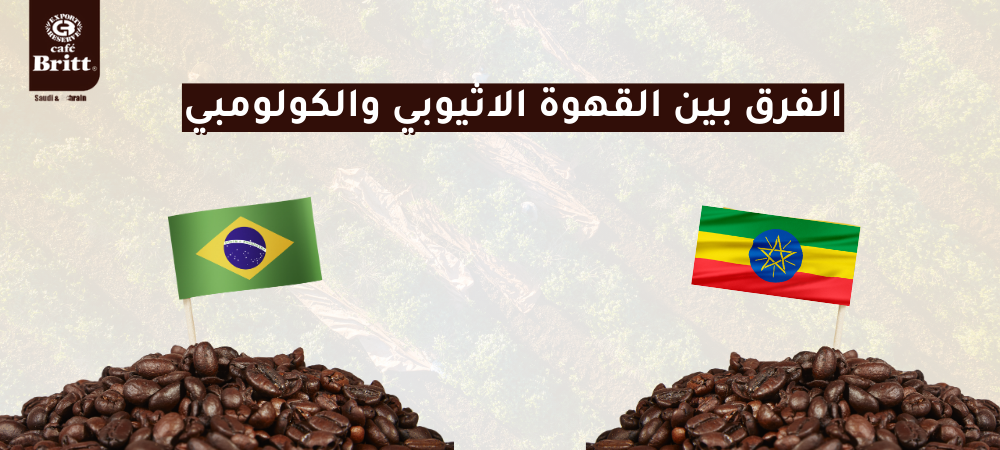The difference between Ethiopian and Brazilian coffee is a topic of interest to many coffee lovers around the world. While Ethiopian coffee is known for its rich, complex flavor, derived from the lands where the beans originated, Brazilian coffee is characterized by its smooth, balanced taste, reflecting Brazil's vast geographic and environmental diversity. The preparation methods and flavors of the two types differ, making them distinct choices for anyone seeking a unique and luxurious coffee experience.
Learn the difference between Ethiopian and Brazilian coffee from Coffee Brite
In the world of coffee, taste is never ordinary or conventional. Every cup carries a different story, inspired by a special place and time. From the heart of Ethiopia's green mountains to the vast farms of Brazil, these two unique coffees offer a variety of flavors and experiences. But what's the difference between Ethiopian and Brazilian coffee? This difference lies in the influence of the environment and the way the beans are grown on the taste and aroma. Ethiopian coffee exudes a floral and acidic flavor, captivating the senses with its lightness and natural charm, while Brazilian coffee has a rich and creamy flavor, full of a balance of chocolate and nuts. Each type tells the story of its place, and each cup reflects the character of the soil and atmosphere where it was grown.
Discover the wonders of flavor with East Brazil Diamond Roastery from Coffee Pret, offering you a unique experience of expertly dried coffee from the renowned Minas Gerais region. The beans come from the Red and Yellow Burion variety, which grows at an altitude of 1,100 meters, giving you an exceptional taste that reflects the authenticity of this region. With every sip, you'll enjoy creamy chocolate spices, rich caramel, and roasted nuts that flow smoothly on your tongue. With a heavy body that adorns every cup, this coffee is the perfect choice for those looking for a balanced and deep taste. Enjoy an unparalleled coffee experience with Brazil Diamond from Coffee Pret.
The difference between Ethiopian and Brazilian coffee in terms of cultivation methods and environmental impacts
The difference between Ethiopian and Brazilian coffee in terms of cultivation methods and environmental influences is evident in a number of factors that influence the flavor of each type of coffee.
Agriculture in Ethiopia: Ethiopia is considered the birthplace of coffee, where coffee beans grow in a natural environment free from chemical fertilizers or pesticides. Ethiopian coffee is often grown in high mountainous areas, where the climate is cool and humid, allowing the beans to grow slowly and giving them a complex and unique flavor. Ethiopian coffee is also grown in the shade of dense trees, providing natural protection from direct sunlight and enhancing the floral and citrusy flavors for which it is famous. The agricultural method in Ethiopia also relies on what is known as organic farming, where coffee is grown alongside other crops, promoting biodiversity and preserving soil health.
Agriculture in Brazil: Brazil is the world's largest producer of coffee and boasts a wide geographic diversity across its farms. Brazilian coffee is typically grown on vast plains and expansive lands, with larger areas compared to Ethiopian farms. Brazilian agriculture relies more heavily on modern farming techniques such as the use of fertilizers and pesticides to ensure high yields. Brazilian coffee is grown in areas with a hot, dry climate, which allows the beans to grow faster than Ethiopian coffee. Cultivation often takes place in open-air farms that benefit from direct sunlight, contributing to the rich, creamy flavors, such as the nutty and chocolate notes characteristic of Brazilian coffee.
Environmental influences: Environmental influences play a significant role in shaping coffee flavor. In Ethiopia, biodiversity is a key factor influencing coffee taste. Ethiopian coffee farms are often located in unpolluted areas, which helps preserve the fresh, natural flavor of the beans. In contrast, Brazilian coffee is influenced by modern farming techniques and the widespread use of machinery, which may reduce the impact of the natural environment on the flavor, but still delivers balanced, robust flavors.
In general, Ethiopian coffee offers complex, acidic flavors, while Brazilian coffee offers a rich, creamy taste, due to the differences in cultivation methods and environmental influences in each country.
Enjoy an unparalleled coffee experience with East Ethiopia's Bona Roastery from Coffee Britt. We offer you beans from Yurgacheffe in Ethiopia, where they grow at an altitude of 1,700 to 2,200 meters, imparting a rich and complex flavor. These beans are anaerobic processed for a distinctive and unique taste. With the Herlium variety, each cup will transport you to a world of harmonious flavors, where you'll discover deep chocolate, aromatic flowers, and delicate sweetness, as well as complex fruits such as red grapes, nuts, caramel, and a light hint of tobacco. A rich body and exceptional taste make it the perfect choice for coffee lovers seeking a unique and beautiful taste in every sip.
The difference between Ethiopian and Brazilian coffee in terms of flavor differences
The difference between Ethiopian and Brazilian coffee in terms of flavor is one of the most significant factors that make each unique. Ethiopian and Brazilian coffees have two completely different flavors, reflecting the agricultural environment, climate, and processing methods used in each country.
Ethiopian Coffee: Ethiopian coffee is considered one of the most popular specialty coffees, thanks to its complex and refreshing flavor. Ethiopian beans often feature distinct citrus flavors, reminiscent of cranberries, tropical fruits, or citrus fruits like lemon. Some Ethiopian coffees may also contain hints of floral notes such as lavender and jasmine. These notes make Ethiopian coffee light and delicious, making it an ideal choice for those who enjoy a fresh and complex coffee taste.
Brazilian Coffee: In contrast, Brazilian coffee offers a richer, more balanced flavor. Due to Brazil's hot, dry climate, Brazilian coffee often has a rich flavor, with hints of chocolate, nuts (such as walnuts or almonds), and sometimes creamy notes like milk. Brazilian coffee tends to be less acidic than Ethiopian coffee, giving it a smoother, sweeter character. Additionally, due to the processing methods Brazil uses (such as dry or semi-dry processing), the coffee becomes more intense in flavor with a thick, sweet texture.
Flavor differences:
- Ethiopian coffee : acidic, floral, with tropical fruit flavors such as berries and citrus.
- Brazilian coffee : rich, creamy, with nutty, chocolatey, and naturally sweet notes, less acidic.
So, the difference between Ethiopian and Brazilian coffee in terms of flavors can be summarized as follows: Ethiopian coffee highlights acidic and complex flavors, while Brazilian coffee highlights a creamy and rich character with richer, more balanced flavors.
In conclusion, it's clear that the difference between Ethiopian and Brazilian coffee isn't limited to taste and aroma alone. It also extends to cultivation and processing methods, which reflect significant differences in the coffee experience. While Ethiopian coffee has distinct citrusy and fruity flavors, Brazilian coffee offers a rich, warm flavor that appeals to those who prefer a more balanced and smooth coffee. Whatever your preference, both coffees will remain a great choice for coffee lovers looking for a rich and unique experience.

